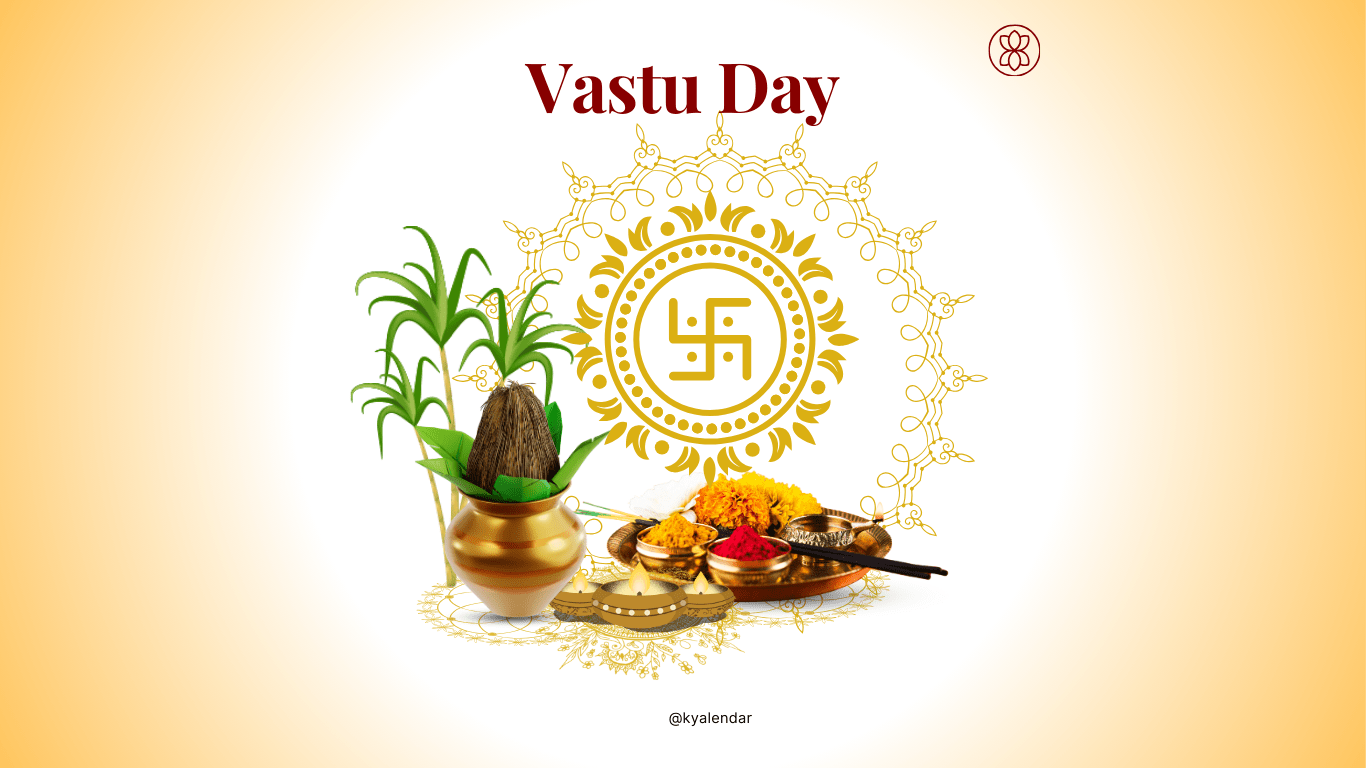
- This event has passed.
Vastu Day
September 17

Vastu Day is a day dedicated to the ancient Indian science of architecture and design known as Vastu Shastra. This discipline combines architecture with various elements of Hindu philosophy, providing guidelines for creating spaces that harmonise the energies of nature and the human body. Vastu Shastra, often referred to as the “yoga of space,” is deeply rooted in the belief that the five elements of nature—earth, water, fire, air, and space—play a vital role in shaping our environment, and in turn, influence our well-being, prosperity, and happiness.
The Origins of Vastu Shastra
Vastu Shastra dates back thousands of years, originating from the ancient Hindu texts known as the Vedas. These principles were traditionally applied to the design of temples and palaces, with the intention of creating spaces that were spiritually aligned and energetically balanced. Over time, the practice extended to the construction of homes, businesses, and other buildings.
The underlying belief in Vastu Shastra is that every structure has its own energy field. By ensuring that a building or space is aligned with the natural flow of energy, one can enhance harmony and attract positive influences in life.
What is Vastu Day?
Vasstu Day is a modern-day celebration of this ancient science, highlighting its significance in contemporary architecture and lifestyle. It is observed by people who follow Vastu principles and those interested in integrating these ideas into their homes, workplaces, or community spaces.
On Vasstu Day, individuals and businesses may:
- Seek Vastu Consultations: Many people use this day to consult with Vastu experts for advice on optimising the design and layout of their homes or offices. Vastu consultations focus on aligning the structure with natural energies, paying particular attention to the layout, orientation, and placement of key elements such as rooms, doors, windows, and furniture.
- Make Adjustments to Spaces: Some may take the opportunity to make changes to their living or working spaces in accordance with Vastu principles. This could involve re-arranging furniture, repositioning doors, or even undertaking structural modifications to improve energy flow.
- Educate Themselves on Vastu Shastra: On Vasstu Day, individuals might attend workshops, webinars, or seminars to learn more about the basics of Vastu Shastra. These events can provide insights into how to apply Vastu principles in daily life, from choosing the right plot of land to selecting the optimal colour scheme for interiors.
- Cleansing Rituals: Many Vastu followers perform rituals to cleanse their spaces, removing any negative energy and fostering an environment that promotes well-being. This could involve the use of traditional practices such as lighting lamps, burning incense, or using natural elements like water and earth to purify a space.
Key Principles of Vastu Shastra
Vastu Shastra is based on several key principles, each of which contributes to the overall harmony of a space. On Vasstu Day, individuals are encouraged to reflect on these principles and how they can be applied to their surroundings.
- Orientation and Directions: Vastu Shastra places significant importance on the orientation of a building. Each direction is associated with a particular element and influences different aspects of life. For example, the northeast is linked to water and is considered auspicious for the entrance of a house, while the southeast is associated with fire, making it ideal for kitchens.
- Room Placement: The placement of rooms within a home or building is a fundamental aspect of Vastu. For instance, the master bedroom should ideally be located in the southwest, which represents stability and grounding, while the kitchen, representing fire, is best suited to the southeast or northwest.
- Balance of the Five Elements: Vastu Shastra is centred around the idea of balancing the five natural elements—earth, water, fire, air, and space. Ensuring that these elements are in harmony with the structure and design of a space is thought to promote physical and mental well-being.
- Energy Flow: One of the most important aspects of Vastu is the flow of energy, or “prana,” through a building. A well-designed space according to Vastu principles will allow energy to move freely and positively, promoting health, wealth, and happiness for its inhabitants.
The Importance of Vasstu Day
Vasstu Day serves as a reminder of the importance of creating spaces that nurture and support human life. In an increasingly hectic and modern world, the principles of Vastu Shastra offer a timeless framework for designing environments that are not only aesthetically pleasing but also energetically aligned.
For many people, Vastu Shastra goes beyond mere superstition or tradition—it is a holistic approach to living, one that recognises the profound impact that our physical surroundings can have on our inner lives. By observing Vasstu Day, individuals acknowledge the deep connection between nature, energy, and the built environment, seeking to create homes and workplaces that are conducive to health, happiness, and success.
Conclusion
Vasstu Day is an opportunity to explore the rich tradition of Vastu Shastra and how its principles can be applied to modern living. Whether through making adjustments to one’s home or learning more about the science of space, the day encourages individuals to align their surroundings with the forces of nature, promoting harmony, balance, and well-being.
In essence, Vastu Shastra offers a blueprint for living in harmony with the environment, and Vasstu Day is a celebration of that connection. It invites us to consider how we can make our spaces more positive and energising, ultimately leading to a more fulfilled and peaceful life.